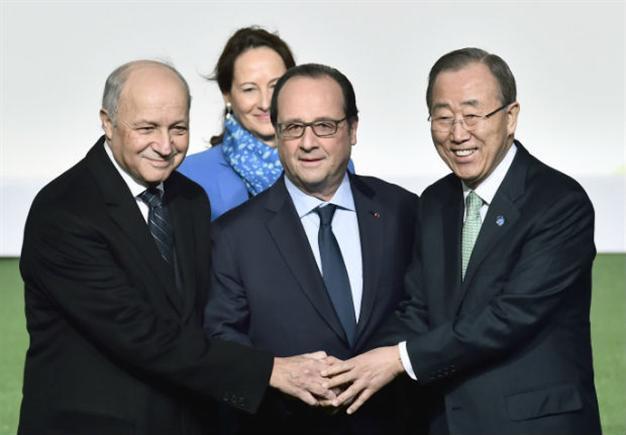World leaders in Paris for climate-rescue summit
LE BOURGET, France - Agence France-Presse

French Foreign Affairs Minister Laurent Fabius (L), President-designate of COP21, French Minister of Ecology, Sustainable Development and Energy Segolene Royal (2ndL), French President Francois Hollande, and Secretary-General of the United Nations Ban Ki-moon, arrive for the opening of the UN conference on climate change, on November 30, 2015 at Le Bourget, on the outskirts of the French capital Paris. AFP photo
World leaders launched a whirlwind day of talks in the French capital on Nov. 30 aimed at forging an elusive agreement to stave off calamitous global warming.The summit kicks off nearly a fortnight of talks intended to end two decades of international bickering with a pact that would limit emissions of the greenhouse gases blamed for climate change.
About 150 world leaders, including from the United States, China, India and Russia, converged in a northern Paris venue bristling with security following this month's terror attacks in the French capital.
Scientists warn that, unless action is taken soon, mankind will endure ever-worsening catastrophic events, such as droughts that will lead to conflict and rising sea levels that will wipe out low-lying island nations.
Negotiators have also vowed to forge an ambitious deal to honour the 130 people killed in the Nov. 13 attacks that were claimed by the Islamic State of Iraq and the Levant (ISIL) group.
"The fate of humanity is at stake in this conference. After the attacks in France, we have to deal with the urgent priorities and respond to the terrorist challenge but also act for the long term," French President Francois Hollande said.
In an interview with French daily newspaper "20 minutes", Hollande said leaders would meet in Paris "to reaffirm their solidarity with France" and to "assume their responsibilities in the face of the warming of the planet".
"History will judge the heads of state and government harshly if, in December 2015, they miss this opportunity."
Hollande arrived at the venue early Nov. 30 to welcome the leaders, first meeting with UN Secretary General Ban Ki-moon. The summit is scheduled to open at 1000 am (0900 GMT).
The Paris attacks appeared to have galvanised many world leaders in their determination to stand up to terrorism and push on with the climate struggle.
US President Barack Obama's first act after touching down in Paris early on Nov. 30 was to visit the scene of the worst carnage at the Bataclan concert venue.
The summit is "an opportunity to stand in solidarity with our oldest ally... and reaffirm our commitment to protect our people and our way of life from terrorist threats," Obama said in a Facebook post before flying to Paris.
The United Nations has hosted annual summits to tackle the vexed global warming issue since 1995, but all previous efforts have foundered, primarily due to deep divisions between rich and poor nations.
Many poor nations insist rich countries bear the most responsibility for tackling the problem because they have burnt the most fossil fuels since the Industrial Revolution on their way to prosperity.
But the United States and other developed nations insist more must be done by China, India and other emerging countries, which are burning increasing amounts of coal to power their fast-growing economies.
Potential stumbling blocks in Paris range from providing finance for climate vulnerable and poor countries, to scrutiny of commitments to curb greenhouse gases and even the legal status of the accord.
Still, important progress has been made ahead of the meeting. One of the key successes has been a process in which 183 nations have submitted voluntary action plans on how they would tackle global warming.
UN climate chief Christiana Figueres said these provide the architecture for more ambitious efforts that could eventually limit global warming to less than two degrees Celsius (3.6 degrees Fahrenheit) from pre-Industrial Revolution levels.
Two degrees C is the threshold at which scientists say the worst impacts of global warming will be inevitable.
To pressure world leaders into forging an agreement, more than half a million people participated in climate protests around the world over the weekend.
"There is no planet B" and "Our Children Need a Future" read placards held by some of the 50,000 people who turned out in London's Hyde Park, in scenes replicated across the world.
"The charge from the streets for leaders to act on climate has been deafening, with record numbers turning out across the world," said Emma Ruby-Sachs, campaign director for Avaaz, one of the organisers.
French authorities had banned protests in Paris due to security fears following the terror attacks.
But in a show of defiance and determination to have their voices heard on climate change, thousands of people in Paris gathered to create a two-kilometre (1.2-mile) human chain.
Their stand was disrupted, however, when a band of anti-capitalist militants infiltrated the protests, leading to clashes with riot police which saw hundreds of arrests. Some 317 people were in custody, police sources said Nov. 30.
On a more artistic precursor to the talks, the Eiffel Tower was turned green on Nov. 29 as part of an art project that will see "virtual trees" grow on the landmark to support reforestation.
















